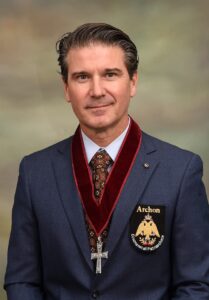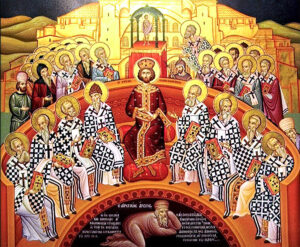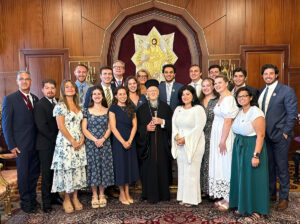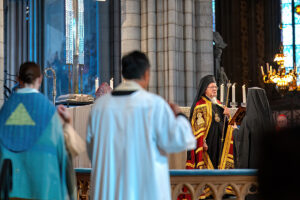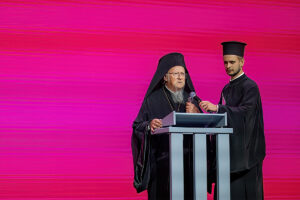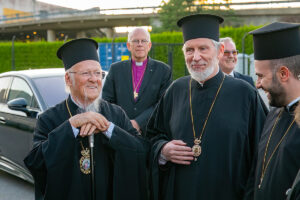Message from His All-Holiness at the International Conference on Religious Diplomacy held in Athens today
“Peace between religions is a fundamental prerequisite for peace between peoples and cultures,” the Ecumenical Patriarch Bartholomew pointed out in his recorded message to the International Conference on Religious Diplomacy, on the topic “Religion in the Modern World: Challenges and Prospects for Dialogue and Peace,” co-organized by “Foreign Affairs: The Hellenic Edition” magazine and the National and Kapodistrian University of Athens and taking place today, Monday, November 11, in Athens.
In his message, His All-Holiness pointed out, among other things, that “religions must develop their peacekeeping function more effectively,” and reiterate that ‘violence and war in the name of religion and God is violence and war against religion and God.’ Religions must cease to give welcome arguments to the opponents of faith and to those who seek to identify religion with its negative aspects. It is unacceptable for representatives of religions to appear as preachers of fanaticism, to ignite the flame of hatred and to allow the heart to be used by unscrupulous people for alienated, non-peaceful, purposes.”
He of course recalled that “in view of the outbursts of religious fundamentalism, of brutal violence, the destruction of religious monuments, the impending or even ongoing ‘clash of civilizations,’ persecution of religious minorities, and the widespread violation of religious freedom, a Great Council of the Orthodox Church (Crete, 2016) condemned these morbid expressions of religiosity and praised the importance of interfaith dialogue and its contribution to peace.”
“It has been rightly said that ‘the Gordian knot of peace is not untied by the sword of Alexander the Great. Peace is an eternal challenge and a task that is never fulfilled, it is never guaranteed forever, and it requires constant struggle. We are “doomed” to struggle and suffer for peace.’ After all, Our Humility praises and supports any sincere initiative for peace, and continuously strives for the dialogue of religions and for the strengthening of their contribution to reconciliation and solidarity,” he said elsewhere in his message.
Following is the full text of the Message of the Ecumenical Patriarch to the International Conference on Religious Diplomacy on “Religion in the Modern World: Challenges and Prospects for Dialogue and Peace”:
The Honorable Ms. Lukas G. Katsoni, Editor-in-Chief of Foreign Affairs Magazine: The Hellenic Edition, the daughter of Our Humility in Our dear Lady, grace, peace and blessing from God.
We have experienced for the last decade a reassessment of the role of religion in the lives of individuals and in society. Religion is dynamically returning to the forefront, appearing to be an important factor in the present and future of mankind. No analysis of the present situation is complete unless there is a reference to the influence of religion. In this discussion, four important functions of religion are highlighted: the first has to do with the meaning of human life. Religion gives vital answers to our deep existential problems and a steady orientation to human existence. Secondly, religion provides identity to peoples and cultures. Therefore, those who know the religion of the other have access to the characteristics of his or her culture. Thirdly, the most important cultural achievements of man, his highest and most important intellectual and artistic works, are related to religion. The fourth function of religion relates to its contribution to peace. Peace between religions is a fundamental prerequisite for peace between people and civilization.
Regarding the last point, which is your conference theme, there has been criticism of religion over the fact that it does not seem to be working effectively against violence in the name of God.
In view of the explosion of religious fundamentalism, of brutal violence, the destruction of religious monuments, the impending or even ongoing ‘clash of civilizations,’ persecution of religious minorities, and the widespread violation of religious freedom, a Great Council of the Orthodox Church (Crete, 2016) condemned these morbid expressions of religiosity and praised the importance of interfaith dialogue and its contribution to peace. In the Encyclical of the Council, the following points are noted: “Today We are experiencing today an increase of violence in the name of God. The explosions of fundamentalism within religious communities threaten to create the view that fundamentalism belongs to the essence of the phenomenon of religion. The truth, however, is that fundamentalism, as “zeal not based on knowledge” (Rom 10.2), constitutes an expression of morbid religiosity. A true Christian, following the example of the crucified Lord, sacrifices himself and does not sacrifice others, and for this reason is the most stringent critic of fundamentalism of whatever provenance. Honest interfaith dialogue contributes to the development of mutual trust and to the promotion of peace and reconciliation.” (§ 17).
And we also emphasize that religions must develop their peacekeeping function more effectively, and reiterate that “violence and war in the name of religion and God is violence and war against religion and God.” Religions must cease to give welcome arguments to the opponents of faith and to those who seek to identify religion with its negative aspects. It is unacceptable for representatives of religions to appear as preachers of fanaticism, to ignite the flame of hatred and to allow the heart to be used by unscrupulous people for alienated, non-peaceful, purposes.”
Never in the history of mankind has peace been an inexplicable condition, but it has always been the result of inspired initiatives, of bravery and self-sacrifice, of the righteousness of men and women. In our day, many expect that the end of the “Cold War,” the rise of the standard of living, the advancement of science and technology, the information society and global literacy will contribute significantly. But there are new initiatives, cultural conflicts, religious fundamentalism, the struggle for the preservation of popular representation, terrorism, the arms industry and a variety of other economic interests, social problems and injustice, operating today in the context of new violent conflicts and the restriction of freedom and human rights.
It has been rightly said that “the Gordian knot of peace is not untied by the sword of Alexander the Great. Peace is an eternal challenge and a task that is never fulfilled, it is never guaranteed forever, and it requires constant struggle. We are ‘doomed’ to struggle and suffer for peace.” After all, Our Humility praises and supports any sincere initiative for peace, and continuously strives for the dialogue of religions and for the strengthening of their contribution to reconciliation and solidarity.
The Orthodox Church has emphasized and still emphasizes the connection of peace with justice. Concern for peace means the creation of a society of justice and freedom, for the protection of human rights. Fundamental justice in peace is the highest universal good, the true cause, the “bearer of the good,” for human beings, for people, for mankind. The Church must promote the philanthropic traditions and values of the Orthodox tradition, to contribute to the edification of a peaceful human being, who will see in the person of a fellow human being his brother, and not for the sake of his life and freedom from “hellfire.”
With these thoughts, congratulations to the organizers and other contributors to this international conference, with its impressive theme, and wishing you success in all things, we convey to the eloquent speakers and other delegates our Patriarchal blessing, and we beseech for you the grace and mercy of the God of peace, justice and love.

